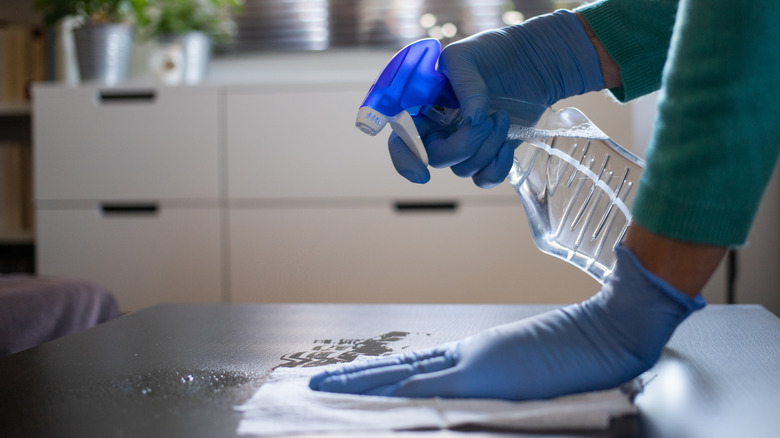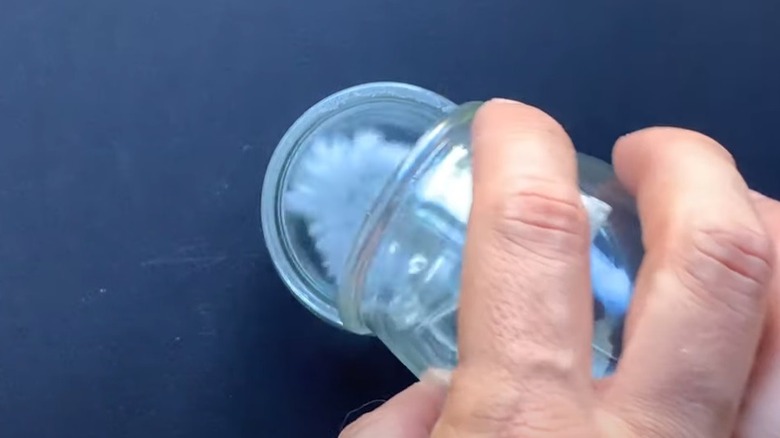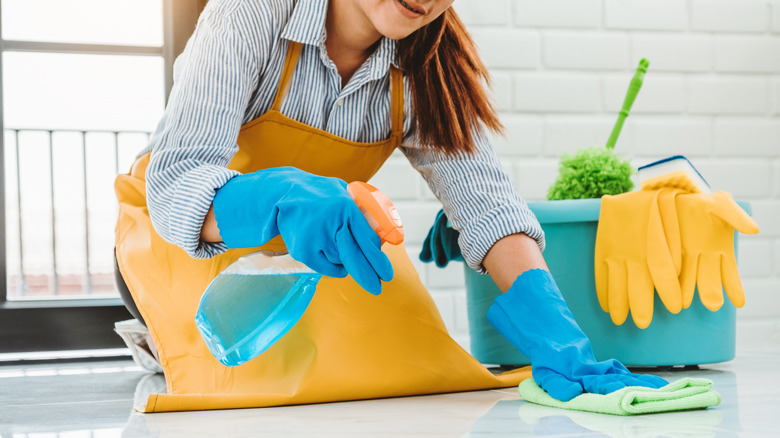Think Twice Before Combining Bleach With This Popular Cleaning Agent
Because of its ability to clean well and deliver disinfecting capabilities, bleach is a popular choice to remove stains and odors. Some people use bleach in non-traditional areas, such as in a garden, to eliminate weeds. However, you do need to take some precautions before using bleach in your home for cleaning or other purposes. One of the most dangerous situations you can find yourself in when using this powerful product is when you mix it with another cleaning agent. For example, mixing bleach with hydrogen peroxide could yield excessive oxygen gas, leading to an explosion. It's important to keep bleach and hydrogen peroxide away from each other because of the potential consequences.
Of course, you don't want to mix these items on purpose. But there's also a danger when you use a cleaning product with hydrogen peroxide and don't realize it. Many general cleaning products contain hydrogen peroxide. If you add bleach to the cleaner to try to make a stronger product, you could create a dangerous, explosive situation. "One should not mix household cleaners as a general rule. You do not necessarily make a strong cleaner by mixing two cleaners together," Neal Langerman, CEO and principal scientist at Advanced Chemical Safety, told Chemical and Engineering News.
What happens when hydrogen peroxide and bleach mix
Bleach consists of sodium hypochlorite, which has one oxygen (O) atom in the molecule, along with an atom of sodium (Na) and one atom of chlorine (Cl). When sold for use in households, the concentration of sodium hypochlorite is 5.25%. With industrial-strength bleach, though, the concentration is about 12.5%. Hydrogen peroxide, meanwhile, consists of two oxygen atoms and two hydrogen (H) atoms. When sold for use in a residential setting, hydrogen peroxide usually has a 3% concentration, but industrial settings can use up to 70% concentration.
When the bleach and hydrogen peroxide molecules react, they both attempt to give away one O atom as an oxidizing agent. This results in the two now-free O atoms combining to make oxygen gas, which is a molecule consisting of two O atoms. The reaction leaves behind a sodium chloride molecule (which is salt) and a water molecule (two H atoms plus one remaining O atom). Alone, none of these new molecules are dangerous. However, the sudden buildup of oxygen gas molecules can occur so fast that it carries excessive force. This force could cause bleach or hydrogen peroxide to splash up into your face.
When these two substances have low concentration levels, you likely will see aggressive bubbling rather than an explosion when mixing them. However, more oxygen gas molecules are created at high concentration levels, increasing the chance of a violent explosion.
Health concerns if you mix hydrogen peroxide and bleach
Because hydrogen peroxide and bleach are potentially dangerous on their own when they contact your skin or eyes, you should always wear protective gear when handling them. Then, if you inadvertently expose the two substances to each other, you'll also have some protection already in place from a possible splash when the rapid onset of oxygen gas molecules occurs. Wear a mask, rubber gloves, clothing protection, and eye protection when working with these chemicals.
Typically, if hydrogen peroxide at residential concentrations hits your skin, it causes irritation. At higher concentrations, it can be dangerously corrosive to skin, eyes, and mucous membranes. Bleach on the skin can cause a chemical burn. If you end up with bleach in your eyes, you could damage the corneas, leading to long-term eye problems. It also can cause irritation and chemical burns in the eyes.
If you mix hydrogen peroxide and bleach, beyond exposing your skin or eyes to these chemicals through a splash, the sudden creation of oxygen gas molecules could increase the fire danger in the area. Oxygen is not flammable itself, but it enhances the ability of other items to burn, providing fuel to a fire. Ultimately, to remain safe, you should never mix bleach with anything but water. It isn't worth the risk of potential exposure to an explosion or another dangerous reaction. In fact, according to FEMA, you should never mix household cleaning products or chemicals at any time.


